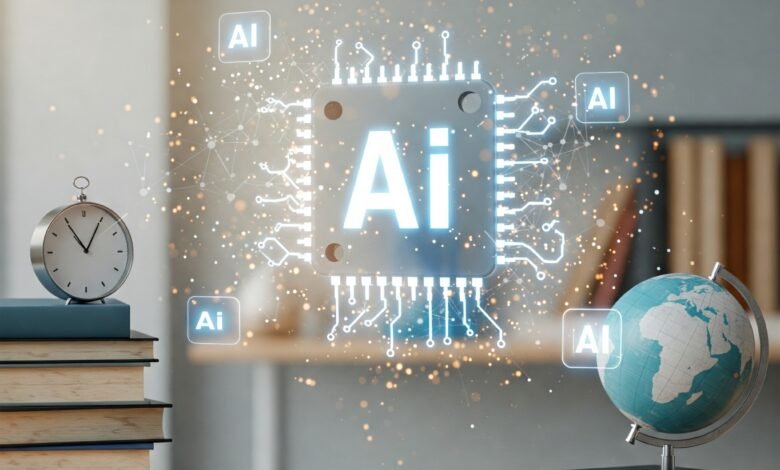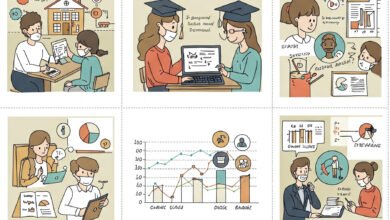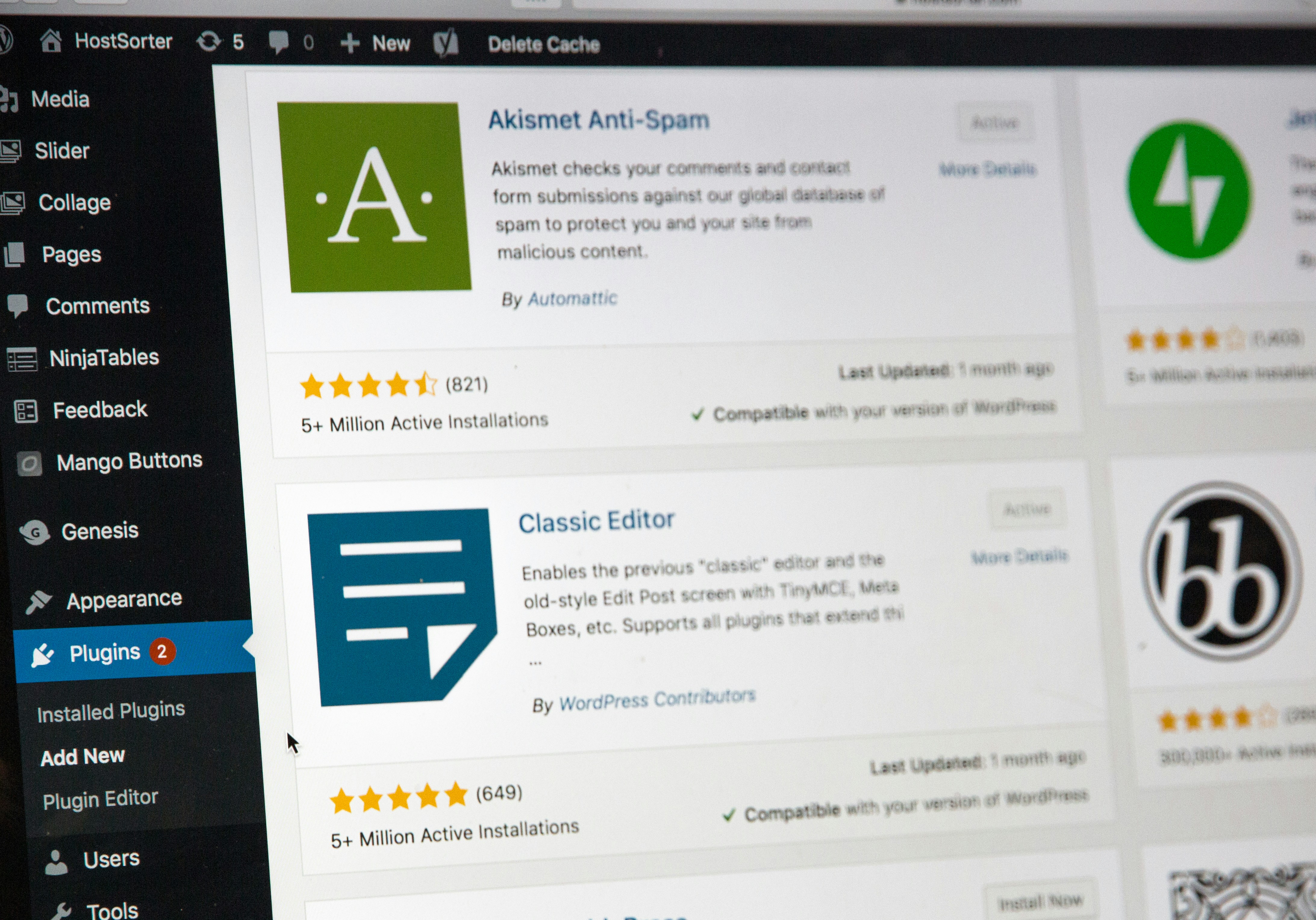AI and Education: How Intelligent Technology is Transforming Learning

Introduction to AI in Education
Artificial Intelligence (AI) has emerged as a transformative force in various sectors, and education is no exception. Defined broadly, AI refers to the simulation of human intelligence processes by machines, particularly computer systems. These processes include learning, reasoning, problem-solving, perception, and natural language processing. The incorporation of AI into educational settings has opened up new avenues for personalized learning, administrative efficiency, and innovative teaching methodologies.
In the realm of education, several intelligent technologies operate under the umbrella of AI. Among these technologies, adaptive learning platforms, intelligent tutoring systems, and data analytics tools are particularly noteworthy. Adaptive learning platforms use algorithms to tailor educational experiences to individual learners, adjusting content and pacing based on their unique needs and performance. Intelligent tutoring systems provide students with personalized assistance, offering targeted feedback and guidance akin to that of a human tutor. Meanwhile, data analytics tools leverage vast amounts of educational data to derive insights that help educators identify trends, measure effectiveness, and develop strategies to enhance student outcomes.
The integration of these AI-driven technologies promotes an interactive and engaging learning environment. By automating administrative tasks, teachers can devote more attention to instructing students and providing support. Additionally, these intelligent systems offer learners customized pathways, accommodating different learning styles and capacities. As a result, students can progress at their own pace, fostering deeper understanding and retention of knowledge.
As we delve deeper into the implications of AI in the educational sector, it is essential to appreciate how these technologies not only support traditional learning methodologies but also pave the way for innovative approaches, enabling educational institutions to better meet the needs of their diverse populations.
Personalized Learning Experiences
Artificial intelligence (AI) has undeniably become a transformative force in the field of education, particularly through the development of personalized learning experiences. By utilizing intelligent algorithms, educational institutions can analyze individual learning styles, preferences, and performance metrics, leading to more tailored educational content. This personalization caters to the unique needs of each learner, fostering an environment that promotes engagement and effectiveness within the educational landscape.
The core of personalized learning lies in the ability of AI systems to analyze vast amounts of data collected from students. These systems evaluate the strengths and challenges faced by learners, allowing educators to deliver customized materials that resonate with their individual pace and style of learning. For instance, a student who excels in visual learning can be provided with resources, such as videos and infographics, while another student who favors auditory processing might benefit more from podcasts or lectures. As a result, AI not only supports differentiated instruction but also promotes student autonomy in the learning process.
Moreover, adaptive learning pathways powered by AI facilitate dynamic learning experiences that adjust to the ongoing performance of each student. If a learner struggles with a particular concept, the intelligent system can detect this challenge and provide additional resources or alternative approaches to help them grasp the material effectively. Conversely, if a learner demonstrates proficiency, the AI can accelerate their learning journey by introducing more complex topics and challenges, thus optimizing their growth in various subject areas.
Ultimately, personalized learning experiences enrich the educational landscape by enabling a diverse range of learning methods tailored to individual students. Through the integration of AI in education, the potential for enhancing academic performance and deepening understanding is monumental, ensuring that all learners have the opportunity to succeed at their own pace.
AI-powered Tutoring Systems
The emergence of AI-powered tutoring systems represents a significant advancement in the realm of educational technology. These intelligent platforms are designed to facilitate student learning outside the traditional classroom setting, providing personalized support tailored to individual needs. By employing artificial intelligence, these systems can adapt to each student’s unique learning style, pace, and comprehension level, thereby enhancing their academic performance.
Numerous platforms have surfaced in recent years, exemplifying the capabilities of AI-based tutoring. For instance, systems like Duolingo utilize machine learning algorithms to customize language learning experiences. This innovative approach allows learners to receive real-time feedback on their progress, encouraging them to engage actively with the material. Similarly, Khan Academy offers tailored practice exercises that adjust in difficulty based on the student’s performance, promoting a deeper understanding of core concepts.
Moreover, AI-powered tutoring systems often incorporate advanced question-and-answer capabilities. Tools like Google’s Learning Assistant can assist students with inquiries ranging from homework help to complex topic explanations. This immediate access to information not only fosters independence in learning but also permits students to clarify doubts at their convenience, eliminating the limitations often found in conventional learning environments.
Furthermore, the role of data analytics in these systems cannot be understated. By tracking student interactions and progress, AI tutoring platforms effectively identify areas in which a student may be struggling. This data-driven approach allows for the development of targeted interventions, which can significantly improve learning outcomes. Additionally, the convenience of on-demand tutoring offers students the flexibility to access help whenever needed, further supporting their academic journey.
In conclusion, AI-powered tutoring systems are redefining the educational landscape by providing personalized and efficient learning solutions. Their ability to adapt to individual needs, offer immediate feedback, and analyze student performance plays a critical role in enhancing student learning and success.
Enhancing Administrative Efficiency
Artificial Intelligence (AI) is significantly transforming the landscape of education by enhancing administrative efficiency across various educational institutions. One of the most notable applications of AI pertains to streamlining routine administrative tasks that traditionally consume considerable time and resources. For instance, AI-driven technologies can automate scheduling processes, allowing institutions to optimize course offerings and classroom assignments based on student enrollment numbers and preferences. This not only minimizes scheduling conflicts but also maximizes resource utilization across the campus.
Moreover, AI is revolutionizing enrollment processes by employing intelligent systems that manage student information and applications more effectively. Automated chatbots and virtual assistants can handle inquiries from prospective students, facilitating information dissemination and guiding them through the application process. This approach not only enhances the user experience but also reduces the administrative burden on staff who would otherwise handle these inquiries manually. The implementation of AI in admission workflows ensures a more streamlined approach, making it easier for both students and administrators to access relevant information.
In addition to scheduling and enrollment, AI’s impact on grading and assessments is particularly noteworthy. Intelligent grading systems can evaluate student submissions with remarkable accuracy, providing timely feedback that is crucial for learning. These systems can analyze written assignments, quizzes, and examinations, allowing educators to focus on personal interaction with students rather than being bogged down by grading logistics. By automating these repetitive tasks, educational institutions can allocate more resources to enhancing the teaching-learning experience.
Overall, the integration of AI into administrative processes is proving to be invaluable for educational institutions. By streamlining various tasks such as scheduling, enrollment, and grading, educators can concentrate their efforts on delivering quality education and fostering student development. This shift not only promotes a more efficient academic environment but also enhances the overall educational experience for both teachers and students.
The Role of AI in Curriculum Development
The integration of artificial intelligence (AI) in education has profoundly influenced the way curricula are developed and refined. By utilizing data analytics, educators and curriculum developers are now equipped to identify gaps in learning materials, ensuring that content remains relevant and effective in meeting student needs. AI technology can analyze vast amounts of data related to student performance, learning styles, and engagement levels. This analysis provides insights that can drive improvements in curriculum design.
One of the major advantages of AI in curriculum development is its ability to track and interpret learning outcomes. By examining patterns in student data, AI can pinpoint areas where students typically struggle, thus revealing weaknesses in the existing curriculum. For instance, if a significant number of students perform poorly on a particular topic, AI can flag this area for further examination and adjustment. This feedback loop allows educators to make informed decisions about curriculum updates, ensuring instructional materials are aligned with real-time student needs.
Moreover, AI can also assist in harmonizing curricula with the latest educational trends. As technology continues to evolve, so do teaching methodologies and student requirements. AI-driven tools can continuously monitor emerging trends in education and recommend adjustments to the curriculum items, ensuring that instructional approaches are not only up-to-date but also diverse in addressing different learning modalities.
Additionally, AI enables personalized learning experiences. By correlating student preferences with curriculum content, educators can tailor materials that cater to individual learner needs, thus enhancing engagement and comprehension. This tailored approach not only maximizes learning potential but also fosters a more inclusive and adaptive educational environment.
Overall, the role of AI in curriculum development is pivotal, as it equips educational institutions with tools to create responsive and dynamic curricula that align with both current educational practices and the evolving needs of learners.
Challenges and Ethical Considerations
The integration of artificial intelligence (AI) in education presents numerous challenges and ethical implications that must be carefully examined. One fundamental concern is data privacy. As educational institutions increasingly rely on AI systems to collect, analyze, and utilize student data, the risk of unauthorized access or misuse of sensitive information escalates. Educational data often encompasses personal details, behavioral trends, and academic records. Striking a balance between leveraging this data for personalized learning experiences and safeguarding students’ privacy rights is a profound ethical dilemma that educators and policymakers need to address.
Algorithmic bias is another critical issue within the context of AI in education. Algorithms developed for educational purposes might inadvertently perpetuate existing inequalities or biases present in the data they analyze. This raises significant ethical concerns, as biased AI systems can lead to unfair treatment of students based on race, gender, or socioeconomic status. To ensure equity in education, continuous monitoring and testing of AI algorithms are essential. It is imperative for educational stakeholders to engage in active discussions about the ethical implications of algorithmic decision-making to foster a more inclusive learning environment.
Moreover, the advent of AI tools in the classroom may lead to reduced human interaction between educators and students. While AI can enhance personalized learning experiences, it may also foster a dependency on technology, potentially diminishing the invaluable human connection that is central to effective education. It is important to recognize that pedagogical relationships and social dynamics are critical components of the learning process. Thus, the deployment of AI in educational settings must be approached with caution, ensuring that technology supplements rather than replaces meaningful human engagement.
Case Studies of AI in Action
The integration of artificial intelligence (AI) in educational institutions has emerged as a dynamic approach to enhance learning experiences. Several case studies provide tangible evidence of AI’s transformative potential in academia, showcasing successes as well as challenges faced during implementation.
One standout example is Georgia State University, which employed an AI-driven chatbot named Pounce to assist students in managing their enrollment and academic inquiries. The chatbot effectively handles routine questions, freeing up faculty and staff to focus on more complex issues. According to university officials, the use of Pounce has contributed to an increase in student retention rates, as it ensures timely responses to students’ needs, ultimately creating a more supportive learning environment.
Similarly, the University of Southern California has adopted AI through its Intelligent Tutoring System. This system personalizes the learning experience by providing tailored feedback and resources based on individual student performance. This approach has led to improved academic outcomes, particularly in STEM disciplines, demonstrating how personalized learning pathways can benefit student engagement and success.
Conversely, not all AI initiatives have yielded the desired results. A notable failure occurred at a prominent high school that implemented an AI grading system intended to streamline assessment processes. Despite initial enthusiasm, educators soon discovered that the system lacked the nuance required for effective grading, often misinterpreting student responses. This case underscores the importance of thorough testing and faculty involvement in the deployment of AI technologies within educational frameworks.
These case studies exemplify the multifaceted impact of AI in education. As institutions continue to explore intelligent technology, the lessons learned from both successful implementations and setbacks will guide future applications. The ongoing evolution of AI in education highlights the importance of adaptability and continuous improvement within learning environments, fostering a culture that embraces innovation.
Future Trends in AI and Education
The intersection of artificial intelligence (AI) and education is poised to advance significantly in the coming years, driven by emerging technologies that enhance the learning experience. One notable trend is the integration of virtual reality (VR) and augmented reality (AR) into educational practices. These technologies offer immersive learning environments that allow students to engage with complex concepts in a more intuitive manner. For instance, VR can transport students to historical events or distant landscapes, while AR can overlay information in real-world contexts, facilitating deeper understanding and retention of knowledge. As these tools become more accessible, educational institutions are likely to adopt them for experiential learning purposes.
Another significant advancement is the application of predictive analytics in educational settings. By analyzing vast amounts of data, educational institutions can gain insights into student performance and identify those at risk of academic failure. Predictive analytics leverages machine learning algorithms to assess factors such as attendance, participation, and assessment results, enabling targeted interventions to support at-risk students. This data-driven approach not only personalizes education but also optimizes resource allocation, enhancing overall educational outcomes.
Furthermore, AI is set to become indispensable as a lifelong learning companion. As the workforce continues to evolve, the need for continuous learning will increase, and AI can cater to this demand effectively. Intelligent tutoring systems can adapt to individual learning paces and styles, offering personalized guidance and resources throughout one’s educational journey. Such systems ensure that learners of all ages remain relevant in a fast-changing job market, promoting skills development and knowledge acquisition. This trend emphasizes the potential of AI not just as a tool for primary and secondary education, but also as a valuable asset in adult education and professional development.
In conclusion, the future of AI in education is filled with promise, incorporating innovative technologies and data-driven strategies to enhance learning experiences and outcomes. The synergy of VR, AR, predictive analytics, and continuous learning tools will likely redefine the educational landscape, creating more engaging, effective, and personalized learning environments.
Conclusion: The Path Forward
As explored throughout this blog post, artificial intelligence is rapidly transforming the landscape of education. From personalized learning experiences to streamlined administrative processes, the integration of intelligent technology demonstrates a profound potential to enhance both teaching and learning. AI-driven educational tools enable students to engage with materials at their own pace, adapting to individual learning styles and preferences. Moreover, educators can leverage analytics to identify learning gaps and tailor their instructional methods accordingly, promoting a more effective learning environment.
The impact of AI in education extends beyond individualized learning. Intelligent systems automate administrative tasks, facilitating more time for educators to focus on student engagement and instructional practices. Additionally, AI aids in the data-driven decision-making process, providing insights that can lead to improved curricular designs and student outcomes. Schools that embrace this technology will likely increase their efficiency and effectiveness, preparing students for a future that increasingly relies on digital competence.
However, embracing AI in the educational sector must be approached thoughtfully. Ensuring equity and accessibility in technological implementation is critical, as disparities in access could further exacerbate existing inequalities in education. Stakeholders—including educators, policymakers, and technology developers—must collaborate to address these challenges by advocating for comprehensive training and resources that empower all educators to utilize AI effectively.
Ultimately, the future of education lies in our willingness to innovate and adapt. By fostering an open-minded culture towards intelligent technologies, educational institutions can harness the full potential of AI, enriching the learning experience for both students and educators alike. As we forge ahead, continuous evaluation and adaptation will be key in maximizing AI’s benefits in educational settings, poised to shape a bright future for learners everywhere.





















